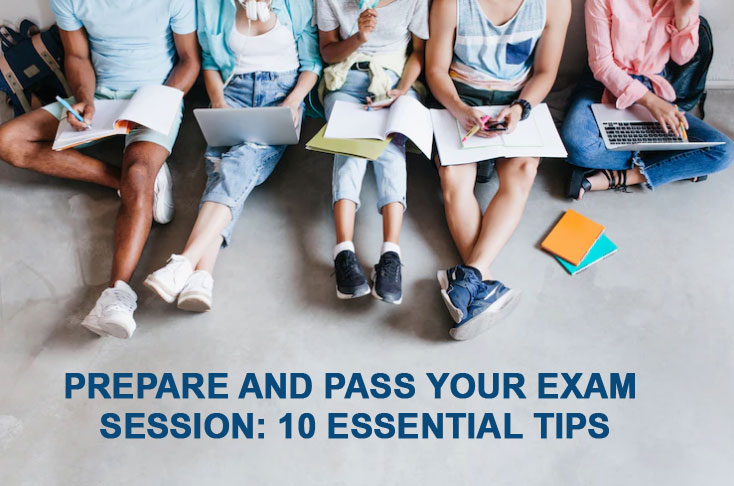1. Estimate time left and things to do
The time that separates you from the exam session is now counted. You will probably find it easier to focus on the essentials and distance yourself from distractions. Try setting a goal to be ready a few days before the start of the session so that you have a few days off. These days may also serve as a valve to fill in some last-minute gaps or unforeseen events.
With this objective in mind, list everything you have left to do and, above all, estimate the time that each of these tasks will take you. These activities (listing and evaluating) are quite complex but they will allow you to identify priorities and leave aside what is less crucial.
2. Go to the latest courses
Les or, at the very least, the last lesson is often devoted to questions from students. It is important to have reviewed your course before this summary and to prepare questions on the points which are not clear. It’s a good test to see if you’ve mastered the material. More generally, pay attention to all the clues that the teachers give you, for example when they repeat the same information several times, when they stipulate that such and such a theme could be the subject of a question exams, when they pause to let you write or when they draw your attention to a concept or part of the course.
3. Sleep, rest, relax, eat
Don’t underestimate the importance of taking breaks right up to the day of the exam. An exam is tiring. You must therefore be on the attack and not tire your body and your memory unnecessarily, in order to keep as much energy as possible for the exam. We advise you to keep your nights intact and to favor, if possible, eight hours of sleep. If you can’t sleep, get up and read something simple, relax in a quiet, cool place if possible. Avoid revising at all costs to pass the time, this activity will stress you out and make you tired. Avoid television and computer screens, the light they diffuse does not promote falling asleep, on the contrary, it excites!
During your days, take regular breaks, especially if you memorize, a highly tiring cognitive activity. Remember, a real break of at least an hour at noon will allow you to regain strength for the end of the day.
4. Avoid brainwashing
Understand by this that ingesting too large amounts of information in a short period of time does not allow you to assimilate the information and, above all, it prevents you from mobilizing so-called “in-depth” learning strategies (therefore effective). You are only skimming the material without consolidating it. To fix the information in your long-term memory, you must review the material several times, if possible at different times, varying the angles of attack. At the last minute, you no longer have time to consolidate the information and you risk forgetting things or getting confused on the day of the exam.
5. Review the set
We know that it will be difficult for you to rest the last days before the exams and that you will tend to revise until the last minute (even if it is not advisable!). If you want to get back into your classes the day before or the day of the exam, try to favor a global approach. Review the assembly, plan, and/or overall structure. This is also a good time to make a concept map (concept mapping or mind mapping) in order to summarize all the information and forge links between them.
Do you like to read about What is 10 tips for successful studies
6. Test yourself
Take time during your revisions to test yourself. On the day of the exam, it is too late to notice that you have deficiencies. You can create review groups where everyone is quizzed on part of the course. Try to really answer questions, orally or in writing, in order to really identify the gaps (if you have any). You will be able to fill them out before the start of the exam session. You can also compel yourself to answer one or two questions in writing, in the same format as what is expected on the exam. This will also help you practice writing a response, if necessary. Having good ideas and mastering an answer is good, knowing how to organize your ideas in order to show teachers that you have the answer is better! The editorial staff can play tricks on you, this is why it is advisable to train in advance. For an oral exam, practice delivering an answer to someone. For an MCQ, practice as much as possible to answer the questions without wasting time.
7. Redo old exams and exercises
Whenever possible, try to get sample questions related to the course to test yourself in the most realistic way. Put yourself in the conditions of the exam and test your knowledge on concrete examples. Do this task without the theory in front of you so as not to confuse “I know, I memorized” with “I can read the answer in the course” or “I know the exercise by heart”. About the exercises: vary them as much as possible so as not to learn them without realizing it. It is your reasoning that you will put to the test and not your ability to memorize a procedure or an answer.
8. Anticipate exam content
Try to imagine the questions you might be asked. They necessarily relate to the course and are not created in order to annoy you. To identify the important parts and themes. Once this is done, try to formulate questions as if you were in the teacher’s shoes. Warning: don’t look too far!
9. Calculate your time during the exam
One of the classic pitfalls during an exam is the lack of time. To avoid this trap, before starting the exam, review all the questions (except for an MCQ) and calculate the time you have for each of them (according to their length and complexity – or points awarded). Look at your watch regularly so as not to overflow and set aside time for each of the questions, as well as for final proofreading. For an MCQ, you only have a short time for each question. If you don’t know, go to the next question, and you will come back to the questions that are problematic later, the goal being to earn as many points as possible and therefore not to miss any question for which you know the answer.
10. Do not redo the exam indefinitely: what is done is behind you
It is very common to have a negative impression at the end of an exam, to doubt oneself. Unfortunately, the review done is behind you and you can’t change anything anymore. So move on, remembering that impressions are often negative but not always indicative of reality. Do not lose your concentration and focus on the rest of the session by telling yourself that your preparation has been good and that you will succeed.
With this good advice, we wish you an excellent exam session and, above all, success!
This post was created with our nice and easy submission form. Create your post!




